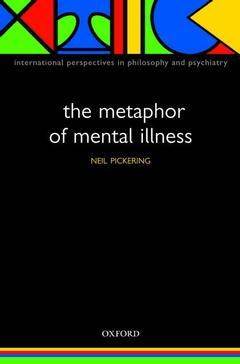The Metaphor of Mental Illness International Perspectives in Philosophy & Psychiatry Series
Langue : Anglais
Auteur : Pickering Neil

Despite the currency of the notion of mental illness, its legal and medical legitimacy, and the panoply of psychiatry and other mental health services which claim to treat it, there are those who take the radical sceptical line that mental illness is a fabrication. This is a book which takes this sceptical line seriously - perhaps more seriously than almost any other book not written by sceptics themselves. 'The Metaphor of Mental Illness' is a revaluation of the traditional philosophical disputes about the existence and nature of mental illness. Sceptics and apologists have generally focused on the legitimacy of extending illness from the physical to the mental, by means of the likeness argument. This says that claimed mental illnesses, from ADHD to schizophrenia, really are illnesses providing they are sufficiently similar to agreed physical illnesses. This book proposes that this argument is flawed: the likenesses to which the argument appeals appear when these examples have been categorised as illnesses, rather than the categorisation being evidenced by or derived from the likenesses. The categorisation of ADHD, schizophrenia, and so on, as illnesses is a matter of metaphor: an imaginative shift into the illness category. The book puts forward a new view of and resolution of the issues, to which it carefully guides the reader. It is a book which engages with many contemporary issues and styles of analysis, but is accessible to anyone not familiar with these. It is full of examples, both historical and modern. It is a book both for the postgraduate student coming to grips with the issues for the first time, for the researcher who is interested in a new approach to the issues, and for mental health workers such as psychiatrists who are interested in the fundamental assumptions of their field of work.
1. Introduction: the categorical argument. Part I - Answering Radical Questions. 2. The likeness argument. 3. The categorical argument. Part II - Metaphor. 4. Metaphor. 5. Two metaphors from physical medicine. Part III - The Metaphor of Mental Illness. 6. The metaphor of mental illness. 7. Attention deficit hyperactivity disorder, social construction, and metaphor. 8. Metaphors and models. 9. Conclusions.
Neil Pickering is a lecturer in the Bioethics Centre of the Dunedin School of Medicine, at the University of Otago, Dunedin, New Zealand. He has a PhD from the University of Wales. He teaches on undergraduate and graduate bioethics programmes at Otago. His primary research interests are in the philosophy of medicine (in particular the nature of disease and the nature and existence mental illness), medical humanities (where he has written on the use of poetry to teach ethics) and alternative medicine. Member of the Executive Committee of the Australasian Bioethics Association, and an Associate Editor of Journal of Bioethical Inquiry and of Medical Humanities Edition of the Journal of Medical Ethics.
This is a well-written stimulating book which addresses important issues that should be thought about and questioned by clinicians and researchers in all fields of psychiatry. In particular, it raises questions around the nature of the sorts of data that confront clinicians and implies that different ways of approaching these may be needed in order to provide the epistemic validity for naming and classifying mental illness.
Date de parution : 12-2005
Ouvrage de 208 p.
15.6x23.4 cm
Thèmes de The Metaphor of Mental Illness :
© 2024 LAVOISIER S.A.S.



